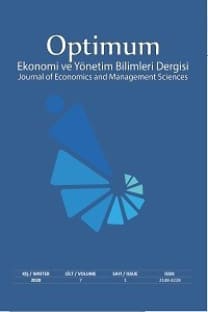Rekabetçi Devlet Modelinin Maliye Politikasına İlişkin Teorik Değerlendirmesi
Rekabetçi Devlet, Maliye Politikaları, İnovasyon
Theoretical Assessment of Competitive State Model on Fiscal Policy
Competitive State Fiscal Policies, Devaluation, Innovation,
___
- KAYNAKÇA
- Aghion, P. ve Peter H. (1998). Endogenous Growth Theory. Cambridge, Massachusetts: The MIT Press.
- Armingeon, K., & Baccaro, L. (2012). Political economy of the sovereign debt crisis: The limits of internal devaluation. Industrial Law Journal, 41(3), 254-275.
- Besson (2007.) TVA sociale, Secrétariat d’État chargé de la Prospective et de l’Évaluation des Politiques Publiques.
- Bucovetsky, S. (1991). Asymmetric tax competition. Journal of urban economics, 30(2), 167-181.
- Caprioli, F., Romanelli, M., & Tommasino, P. (2017). Discretionary fiscal policy in the Euro area: past, present, future (No. 398). Bank of Italy, Economic Research and International Relations Area.
- Cemy, P. G., & Evans, M. (2000). New Labour, globalization, and the competition state. Center for European Studies Working Paper Series, 70.
- Cerny, P. G. (1996). Globalization and other stories: The search for a new paradigm for international relations. International Journal, 51(4), 617-637.
- Dardot, P., & Laval, C. (2014). The new way of the world: On neoliberal society. Verso Books.
- De Grauwe, P. (2012). In Search of Symmetry in the Eurozone (No. 6901). Centre for European Policy Studies.
- Doyle, C., & Van Wijnbergen, S. (1994). Taxation of foreign multinationals: A sequential bargaining approach to tax holidays. International Tax and Public Finance, 1(3), 211-225.EC (European Commission) (2015a). Supply and Demand Side Innovation Policies: Annexes of First Policy Brief, Publications Office of The European Union.
- EC (European Commission) (2015b). Supply and Demand Side Innovation Policies: Annexes of Full Policy, Publications Office of The European Union.
- Edler J. & Georghiou L. (2007). Public Procurement and İnnovation—Resurrecting the Demand Side. Research Policy 36, 949–963.
- Yayın Aralığı: Yılda 2 Sayı
- Başlangıç: 2014
- Yayıncı: -
Mehmet Aldonat BEYZATLAR, İstemi BERK
Türkiye’de Ekonomik Büyüme ve Enflasyon İlişkisi
Rekabetçi Devlet Modelinin Maliye Politikasına İlişkin Teorik Değerlendirmesi
Mustafa Alpin GÜLŞEN, Ali Gökhan GÖLÇEK
Örgütler Arası İlişki Bağlamında Açık İnovasyonu Anlamak: Kavramsal Bir Değerlendirme
Ayşegül ÖZBEBEK TUNÇ, Oya ZİNCİR
Hollanda Adalet Sisteminde Performans Esaslı Bütçeleme Uygulaması
Bulanık ve Gri COPRAS Yöntemleri Kullanılarak Tedarikçi Seçim Modeli Geliştirilmesi
Bahadır Fatih YILDIRIM, Mehpare TİMOR
Gemi Hurdası Piyasalarında Fiyat Oynaklık Yayılımı
Abdullah AÇIK, Sadık Özlen BAŞER
İlk Doğum Kararının Sosyoekonomik Belirleyicileri: Eş Zamanlı Hazard Modelleri
Marka Aşkının Öncülleri ve Sonuçları: Doğu Karadeniz Bölgesinde Bir Uygulama
